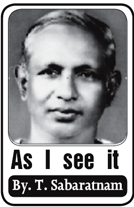Ilankai Tamil Sangam28th Year on the Web Association of Tamils of Sri Lanka in the USA |
|||
 Home Home Archives Archives |
Implementation Pleaseby T. Sabaratnam, The Bottom Line, Colombo, July 2, 2008
Once in a way we hear statements like this
That was from Raja Collure, Chairman of the Official Languages Commission. The promise was first given half century ago by Prime Minister S.W.R.D. Bandaranaike; who enacted the Sinhala Only Law which stated, “The Sinhala language shall be the one official Language of Ceylon,” who said the sentiments of the Tamils would be respected. He confirmed that promise in the pact he signed with Federal Party Leader S.J.V. Chelvanayagam in 1958. The pact undertook to grant to Tamil the status of the language of a national minority and to make it the language of administration of the Northern and Eastern Provinces. That was his response to Chelvanayagam’s demand for parity for the Tamil language. Bandaranaike kept his promise. In September 1958, he enacted the Tamil Language (Special Provisions) Act which made Tamil the medium of instruction for Tamil students in schools and universities; provided for admission of Tamils to the government service; made it possible for the public to transact business with the government in Tamil and made Tamil the language of administration in the Northern and Eastern Provinces. The regulations needed to implement the 1958 Act were not made. The UNP spoilt it. Its leader Dudley Senanayake vowed to prevent the enactment of the regulations and offered to sacrifice his life to stop it. Bandaranaike tore up the pact yielding to UNP pressure. In 1965, Dudley Senanayake offered to do the very thing he prevented Bandaranaike from doing. In his pact with Chelvanayagam, the D-C Pact, he expanded the scope of the B-C Pact by agreeing to make Tamil (a) the language of administration and record in the Northern and Easter Provinces (b) to make it possible for a Tamil speaking person to transact business in Tamil throughout Sri Lanka and (c) to provide for legal proceedings in the Northern and Eastern Provinces, to be conducted and recorded in Tamil. He honoured his pledge by enacting the Tamil Language (Special Provisions) Regulations 1966 Act, which provided for the use of Tamil language (a) for all correspondence between the public and the government in the Northern and Eastern Provinces; and (b) for the translation of all laws, regulations, government notifications, publications into Tamil. The regulations were not implemented because the opposition led by the SLFP and supported by the LSSP and CP opposed it and when that coalition came to power in 1970, it went back to the 1958 Tamil Language (Special Provisions) Act through the 1972 Constitution it enacted. But it provided for the translation of laws and publications in Tamil which were in the 1966 regulations. The 1978 Constitution retained the 1972 constitutional position that Sinhala be the official language and the Language of Administration and Courts countrywide. But it made Tamil a National Language and provided for its use in administration and courts in the Northern and Eastern Provinces. No enabling legislation was needed to implement these provisions. The 13th Amendment to the Constitution has two parts: the Official Language, and the Provincial Council system. The first part contains these provisions:
The Tamil United Liberation Front was not satisfied with merely naming Tamil as an official language and took up that matter with Indian Prime Minister Rajiv Gandhi. President Jayewardene then enacted the 16th Amendment which was enacted in December 1988. It deals with (a) Languages of Administration, (b) Languages of Legislation and (c) Languages of the Court. Under Languages of Administration the 16th Amendment provides a scheme where Sinhala and Tamil are made the languages of administration and courts. Taking the practical needs of the people, it provides that Tamil be used in the Northern and Eastern Provinces and Sinhala in the rest of the country. But it provides that Sinhala and Tamil be made the languages of administrations in the Assistant Government Agent divisions where both linguistic groups live in significant proportions. It also provides for the right of every Sri Lankan citizen to transact his business with the government and its institutions in his language. The 16th Amendment is part of the present constitution and had been incorporated into it. So what the Tamils need is the implementation of the present Constitution. The Tamils would be satisfied if the last offer made by the Sinhala leaders is implemented. The last offer was the constitutional draft presented to Parliament by the Chandrika Kumaratunga government in August 2000. It only consolidates the series of agreements reached from the time of S.W.R.D. Bandaranaike to that of J.R. Jayewardene. It states the position clearly and coherently. It says, “The official languages of the Republic shall be Sinhala and Tamil.” It adds, “Sinhala and Tamil shall be the languages of administration throughout the Republic.” Then it spells out the scheme of implementation, that Tamil would be the language of administration and courts in the Northern and Eastern Provinces and Sinhala in the rest of the country. It also makes provision for the use of Sinhala and Tamil in the Assistant Government Agent divisions where both linguistic populations live in significant number. All that the Tamils are asking for is implementation and not reminders.
| ||
 That’s it. Then the Tamils will have to wait for months to hear a similar reminder that the promise to permit them to do their business with the government in their language is yet to be honoured.
That’s it. Then the Tamils will have to wait for months to hear a similar reminder that the promise to permit them to do their business with the government in their language is yet to be honoured.